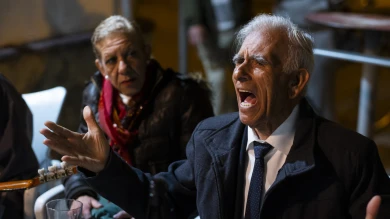-
Monday, 23 May 2022 Sabatini Building, Auditorium
Session 1. Opening Lecture
TicketsThe Inequation of Prime Numbers
—Conducted by Gonzalo García-PelayoMathematics as a measurement of chance is behind major avant-garde art operations in the twentieth-century, such as Dadaism, Calculated Abstraction or Process Art. García-Pelayo would embark upon a similar path to Marcel Duchamp when he decided to turn a material accident, the factory specs of roulette tables, into a predictive method that would see him win in casinos around the world. It would also result in him being banned from different casinos, a battle the film-maker would later win in court, and lead to the manufacturing of new “anti-Pelayo” tables. In this master lecture, the film-maker picks apart the mathematical formula that has most interested him, that which expresses the primality of numbers; that is, a paradigm that is not based on what it is, equality or even numbers, but rather what it isn’t, the inequality of odd numbers. “For me, this formula has an aesthetic connection with my considerations inside counterculture, given that it would be an inequation of official culture”, the film-maker asserts.

-
Wednesday, 25 May 2022 – 7pm / Second session: Friday, 10 June 2022 – 7pm Sabatini Building, Auditorium
Session 2. Seville, Counterculture Capital, Despite the Sorrows
TicketsGonzalo García-Pelayo. Smash and Gong in Dom Gonzalo
Spain, 1968, colour, original version in Spanish, Super-8 transferred to digital, 4’30’’Juana Dolores. Miss Universe
Spain, 2021, colour, original version in Spanish, DA, 14’Gonzalo García-Pelayo. Living in Seville
Spain, 1978, colour, original version in Spanish, DA, 108'—Featuring a conversation between Gonzalo García-Pelayo and Paulino Viota in the second part
There is a counterculture that is unmistakeably southern — chaotic, carnivalesque, marginal, working class — with Seville its epicentre and its beginnings the Dom Gonzalo night club, founded by Gonzalo García-Pelayo in 1968. The session begins with the only existing Super-8 footage of this setting, shot by García-Pelayo, and with a Smash and Gong concert, two legendary bands that fused psychodelia and flamenco, a musical combination which the film-maker, also a music producer, worked on decisively. Living in Seville is a film-paean which outlines the instability of transition-to-democracy Spain (abuses of police power, squats, workers’ strikes) with an irrepressible urge to live and love. With echoes of Jean-Luc Godard in terms of youth and passion — Miguel is torn between Ana and Teresa — and also Jean-Marie Straub and Danielle Huillet in the use of language and directing actors, Living in Seville culminates in a reading of the Spanish Constitution, casting light on new cinema for a new era. The first of these sessions concludes with a talk by Juana Dolores on eroticism, inspired by Godard’s Masculin Féminin, and the sexual theories of Georges Bataille.
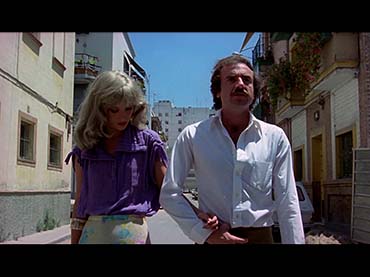
-
Friday, 27 May 2022 – 7pm / Second session: Saturday, 11 June 2022 – 7pm Sabatini Building, Auditorium
Session 3. Mad Love
TicketsJosé Luis Tirado. Mother, Saint, Whore
Spain, 2019, colour, original version in Spanish, DA, 24’Gonzalo García-Pelayo. Manuela
Spain, 1975, colour, original version in Spanish, DA, 98'—A concert performed by Laura Merchal in homage to Manuela in the second part
The session opens with a medium-length film by fellow Seville native José Luis Tirado, a work which explores the three roles monotheistic religions attribute to women — the giver of life, the carer and the whore provocateur of male desire — still substantially rooted and visible in contemporary patriarchal society. García-Pelayo’s film Manuela, meanwhile, played by Charo López — or maybe Charo López played by Manuela given the confusion between character and actress — is archetypal of these three roles. It is the director’s first film in an undertaking to make a film version of the same-titled novel by Manuel Halcón and would be the most commercial and arguably conventional of his entire filmography. Yet Pelayo manages to avoid prejudice or gender stereotypes to show the power of love as an implacable force amid the secular class struggles between tenant farmers and landowners that have dominated the Andalusian countryside throughout history. André Breton and his “mad love” and the sadistic imagery of Luis Buñuel hover over the film, although the wonderful flamenco dance at the beginning and the film’s transgressive ending with the most forbidden of taboos stare down any kind of reference point.
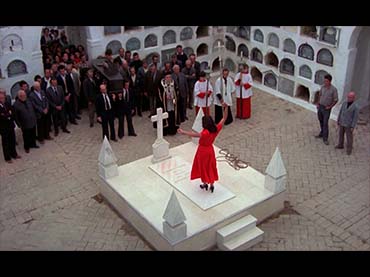
-
Saturday, 28 May 2022 – 7pm / Second session: Thursday, 16 June 2022 – 7pm Sabatini Building, Auditorium
Session 4. The Liberation of Desire
TicketsMarta Valverde. Mad Things(work in progress)
Spain, 2022, colour, original version in Spanish and audio with a live intervention by the film-maker, DA, 22’Gonzalo García-Pelayo. Seafront
Spain, 1979, colour, original version in Spanish, DA, 84'Philosophical reflections which start from the quotidian and bodies freed in their desires, for, as García-Pelayo’s films remind us, revolution cannot exist without the emancipation of desires. Considered by Paulino Viota, a widely recognised maestro for the film-maker, to be “the most intelligent film in Spanish cinema”, three couples arrange to meet at a seafront house to engage in partner-swapping and, in passing, commemorate the burial of conservative double standards from the dictatorship. More than forty years on, this freedom contrasts with Mad Things, the personal diary of Marina, a 26-year-old woman studying an MA in Contemporary Art while working as a prostitute: Marta Valverde’s work in progress straddles audiovisual practice and performance, in which the sordid and the banal mix with sex, and where business is the only outlook. The second session will see Marta Valverde produce a live version of the piece.
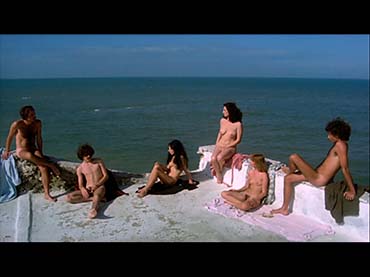
-
Wednesday, 1 June 2022 – 7pm / Second session: Friday, 17 June 2022 – 7pm Sabatini Building, Auditorium
Session 5. The Joys of Revolt
TicketsIan de la Rosa. Farrucas
Spain, 2021, colour, original version in Spanish, DA, 17’Gonzalo García-Pelayo. Joyous Spunking
Spain, 1982, colour, original version in Spanish with French subtitles, DA, 72’—The first session features a conversation with Gonzalo García-Pelayo, moderated by film-maker María Gisèle Royo and artist Julia de Castro, the creators of a film-homage to Joyous Spunking. The second session features a conversation with Javier García-Pelayo.
The authenticity of the margins or the notion of difference experienced by Andalusian bulerías. Farrucas is the second feature-length film by young trans director Ian de la Rosa and depicts four gypsy and Moroccan teenage girls in the impoverished neighbourhood of El Puche in Almería. The hybrid identities of gender and race and those who gaze and those whom are gazed at combine with the desires and yearnings of these young women. Joyous Spunking, meanwhile, is a lo-fi road movie on the friendship between two lower-class anti-heroes and escape as a movement which gives life meaning. In the film, with its high tempo and music crossing the underground and the vernacular —two sides of the same coin for Gonzalo García-Pelayo— a gallery of glorious and incorruptible misfits swirl.
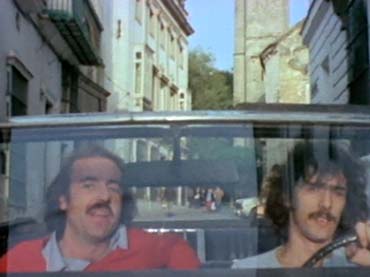
-
Thursday, 2 June 2022 – 7pm / Second session: Friday, 24 June 2022 – 7pm Sabatini Building, Auditorium
Session 6. Between Ritual and Festivity I
TicketsIgnacio Guarderas. The Road to Rocío
Spain, 2020, colour, original version in Spanish, DA, 20’Gonzalo García-Pelayo. Rocío and José
Spain, 1982, colour, original version in Spanish with French subtitles, DA, 85’—A concert performed by the rociero group Madrid in homage to Rocío y José in the second part
Andalusian counterculture feeds off contradictions. Thus, there is nothing strange in the heretic and ultraorthodox church of El Palmar de Troya appearing in the underground fresco Living in Seville, in much the same way as this homage to the road to El Rocío. Synthesising the impressions of Gonzalo García-Pelayo’s twelve years of pilgrimage, Rocío and José looks at two brothers, one starting adolescence, the other well into adulthood, and how love arises for the younger one, José. On the flipside of the carnal desire of his early films, in Rocío and José landscape, the sounds of the road and sevillanas shape a mystical and ascetic poem. The session opens with Ignacio Guarderas, who carries on this anthropological gaze at El Rocío in a medium-length film on two screens which ranges over the stereotype-free natural and human landscape.
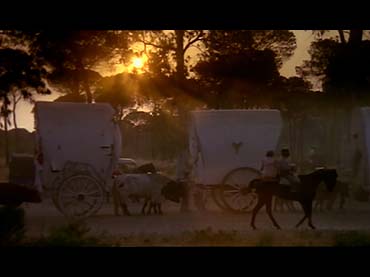
-
Monday, 13 June 2022 – 7pm / Second session: Saturday, 25 June 2022 – 7pm Sabatini Building, Auditorium
Session 7. Between Ritual and Festivity II
TicketsConcha Barquero y Alejandro Alvarado. Descartes
Spain, 2021, colour, original version in Spanish, DA, 21’Gonzalo García-Pelayo. Three Roads to Rocío
Spain, 1986, colour, original version in Spanish, DA, 53’. Courtesy of RTVE—A presentation by Álvaro Arroba in the first part
Two films on the same theme shape the recent history of independent Spanish documentary-making: García-Pelayo’s Three Roads to Rocío and Rocío (1980), Fernando Ruiz Vergara’s censored film. In this session, Descartes is screened, a documentary made from the film reels of this film rejected by the film-maker and found by Barquero and Alvarado recently in the archive of Filmoteca Española. Both films and their epigones respond to two ways of living: Protestant and Catholic, as García-Pelayo asserts. The first renounces mundane pleasure over the fear of guilt or the manipulative ends that hide these pleasures. The second participates in the sensuality offered by these pleasures and being aware that, although they abide by dark ideological interests, glee always deserves penance. There is an issue with Ruiz Vergara’s Rocío: “he is the Protestant version, and I am the Catholic version”, García-Pelayo claims. This session denotes a clash between both belief systems.

Stop Prohibiting Because I Can’t Disobey Everything
The Films of Gonzalo García-Pelayo
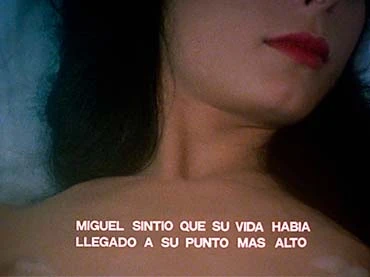
Held on 23, 25, 27, 28, 30 May, 01, 02, 06, 10, 11, 13, 16, 17, 20, 24, 25 Jun 2022
Museo Reina Sofía and Documenta Madrid, an international film festival promoted by Madrid City Council, organise a retrospective on the films made by Gonzalo García-Pelayo (Madrid, 1947) between 1976 and 1986. A cult film-maker, club promoter, music producer, professional gambler, editor and a speculator in the contemporary immaterial economy, García-Pelayo fits multiples lives into one. The facets mentioned condense a personal concept of film, understood as a form of existence based on vitalism, limitless desire, occurrences as a narrative strategy and insubordination to predictability, be it on a formal or political level.
The retrospective bears the title of the first of eleven contemporary films García-Pelayo made over twelve months, between 2021 and 2022, during “the year of eleven films” as he calls it. An unmatched tour de force that demonstrates how film is a way of life, first and foremost, before an industry or profession. These eleven productions are screened in the second part of this series, during September 2022. The title of the programme is also the slogan that best defines García-Pelayo’s filmic corpus and explains with greater clarity a fascination the film-maker has ignited among a young generation of film-makers, artists and producers who have retrieved his body of work, viewing it as the keystone of a heterodox genealogy of Spanish film-making since the 1970s, as well as a model with which to confront a numb society.
The historical films this series assembles are set in Spain’s changing, tumultuous society during the Transition to democracy, in the wake of the death of Francisco Franco and the country joining the European Economic Community (1975–1986). A time in which the cracks of the dictatorship’s political authoritarianism and moral conservatism reach the force of a thriving counterculture and youth’s utopian yearning to build a new society, qualities that run through García-Pelayo’s film-making. With this framework in mind, the series dispenses with a traditional historicist and revisionist orientation to situate the film-maker in a contemporary dialogue, in thematic sessions, with young artists and producers, his major themes reverberating among them: sex as a free territory, misfits and the socially marginalised as lucid and honest anti-heroes, the radical co-existence of the exalted and the popular and music — flamenco, psychodelia, sevillanas — as an eruption of the real in fiction. Among it all is a kindred spirit which transgresses forms and the limits of a self-righteous society in 1975. Or 2022 for that matter.
Organised by
Museo Reina Sofía and Documenta Madrid (19th International Film Festival)
Curators
Chema González (Museo Reina Sofía) and Luis E. Parés (Cineteca Madrid)
Inside the framework of
TIZ 3. Political Matter
Más actividades

Aesthetics of Peace and Desertion Tactics
8 October 2025 – 24 June 2026
The study group Aesthetics of Peace and Tactics of Desertion: Prefiguring New Pacifisms and Forms of Transitional Justice proposes a rethinking—through both a theoretical-critical and historical-artistic lens—of the intricate network of concepts and practices operating under the notion of pacifism. A term not without contestation and critical tension, pacifism gathers under its name a multiplicity of practices—from anti-militarism and anti-war movements to non-violence activism—while simultaneously opening urgent debates around violence, justice, reparation, and desertion. Here, pacifism is not conceived as a moral doctrine, but as an active form of ethical and political resistance capable of generating aesthetic languages and new positions of social imagination.
Through collective study, the group seeks to update critical debates surrounding the use of violence and non-violence, as well as to explore the conflict of their representation at the core of visual cultures. In a present marked by rearmament, war, genocide, and the collapse of the social contract, this group aims to equip itself with tools to, on one hand, map genealogies and aesthetics of peace—within and beyond the Spanish context—and, on the other, analyze strategies of pacification that have served to neutralize the critical power of peace struggles. Transitional and anti-punitive justice proposals will also be addressed, alongside their intersections with artistic, visual, and cinematic practices. This includes examining historical examples of tribunals and paralegal activisms initiated by artists, and projects where gestures, imaginaries, and vocabularies tied to justice, reparation, memory, and mourning are developed.
It is also crucial to note that the study programme is grounded in ongoing reflection around tactics and concepts drawn, among others, from contemporary and radical Black thought—such as flight, exodus, abolitionism, desertion, and refusal. In other words, strategies and ideas that articulate ways of withdrawing from the mandates of institutions or violent paradigms that must be abandoned or dismantled. From feminist, internationalist, and decolonial perspectives, these concepts have nourished cultural coalitions and positions whose recovery today is urgent in order to prefigure a new pacifism: generative, transformative, and radical.
Aesthetics of Peace and Tactics of Desertion, developed and led by the Museo Reina Sofía’s Studies Management, unfolds through biweekly sessions from October to June. These sessions alternate between theoretical discussions, screenings, work with artworks and archival materials from the Museo’s Collection, reading workshops, and public sessions. The group is structured around sustained methodologies of study, close reading, and collective discussion of thinkers such as Judith Butler, Elsa Dorlin, Juan Albarrán, Rita Segato, Sven Lütticken, Ruth Wilson Gilmore, and Franco “Bifo” Berardi; historical episodes such as the anti-nuclear and anti-arms race movement in Spain; and the work of artists and activists including Rojava Film Commune, Manuel Correa and the Oficina de Investigación Documental (Office for Documentary Investigation), and Jonas Staal, among other initial cases that will expand as the group progresses.

Institutional Decentralisation
Thursday, 21 May 2026 – 5:30pm
This series is organised by equipoMotor, a group of teenagers, young people and older people who have participated in the Museo Reina Sofía’s previous community education projects, and is structured around four themed blocks that pivot on the monstrous.
This fourth and final session centres on films that take the museum away from its axis and make it gaze from the edges. Pieces that work with that which is normally left out: peripheral territories, unpolished aesthetics, clumsy gestures full of intent. Instead of possessing an institutional lustre, here they are rough, precarious and strange in appearance, legitimate forms of making and showing culture. The idea is to think about what happens when central authority is displaced, when the ugly and the uncomfortable are not hidden, when they are recognised as part of the commons. Film that does not seek to be to one’s liking, but to open space and allow other ways of seeing and inhabiting the museum to enter stage.

Intergenerationality
Thursday, 9 April 2026 – 5:30pm
This series is organised by equipoMotor, a group of teenagers, young people and older people who have participated in the Museo Reina Sofía’s previous community education projects, and is structured around four themed blocks that pivot on the monstrous.
The third session gazes at film as a place from which to dismantle the idea of one sole history and one sole time. From a decolonial and queer perspective, it explores films which break the straight line of past-present-future, which mix memories, slow progress and leave space for rhythms which customarily make no room for official accounts. Here the images open cracks through which bodies, voices and affects appear, disrupting archive and questioning who narrates, and from where and for whom. The proposal is at once simple and ambitious: use film to imagine other modes of remembering, belonging and projecting futures we have not yet been able to live.

Remedios Zafra
Thursday March 19, 2026 - 19:00 h
The José Luis Brea Chair, dedicated to reflecting on the image and the epistemology of visuality in contemporary culture, opens its program with an inaugural lecture by essayist and thinker Remedios Zafra.
“That the contemporary antifeminist upsurge is constructed as an anti-intellectual drive is no coincidence; the two feed into one another. To advance a reactionary discourse that defends inequality, it is necessary to challenge gender studies and gender-equality policies, but also to devalue the very foundations of knowledge in which these have been most intensely developed over recent decades—while also undermining their institutional support: universities, art and research centers, and academic culture.
Feminism has been deeply linked to the affirmation of the most committed humanist thought. Periods of enlightenment and moments of transition toward more just social forms—sustained by education—have been when feminist demands have emerged most strongly. Awareness and achievements in equality increase when education plays a leading social role; thus, devaluing intellectual work also contributes to harming feminism, and vice versa, insofar as the bond between knowledge and feminism is not only conceptual and historical, but also intimate and political.
Today, antifeminism is used globally as the symbolic adhesive of far-right movements, in parallel with the devaluation of forms of knowledge emerging from the university and from science—mistreated by hoaxes and disinformation on social networks and through the spectacularization of life mediated by screens. These are consequences bound up with the primacy of a scopic value that for some time has been denigrating thought and positioning what is most seen as what is most valuable within the normalized mediation of technology. This inertia coexists with techno-libertarian proclamations that reactivate a patriarchy that uses the resentment of many men as a seductive and cohesive force to preserve and inflame privileges in the new world as techno-scenario.
This lecture will address this epochal context, delving into the synchronicity of these upsurges through an additional parallel between forms of patriarchal domination and techno-labor domination. A parallel in which feminism and intellectual work are both being harmed, while also sending signals that in both lie emancipatory responses to today’s reactionary turns and the neutralization of critique. This consonance would also speak to how the perverse patriarchal basis that turns women into sustainers of their own subordination finds its equivalent in the encouraged self-exploitation of cultural workers; in the legitimation of affective capital and symbolic capital as sufficient forms of payment; in the blurring of boundaries between life and work and in domestic isolation; or in the pressure to please and comply as an extended patriarchal form—today linked to the feigned enthusiasm of precarious workers, but also to technological adulation. In response to possible resistance and intellectual action, patriarchy has associated feminists with a future foretold as unhappy for them, equating “thought and consciousness” with unhappiness—where these have in fact been (and continue to be) levers of autonomy and emancipation.”
— Remedios Zafra

27th Contemporary Art Conservation Conference
Wednesday, 4, and Thursday, 5 March 2026
The 27th Contemporary Art Conservation Conference, organised by the Museo Reina Sofía’s Department of Conservation and Restoration, with the sponsorship of the Mapfre Foundation, is held on 4 and 5 March 2026. This international encounter sets out to share and debate experience and research, open new channels of study and reflect on conservation and the professional practice of restorers.
This edition will be held with in-person and online attendance formats, occurring simultaneously, via twenty-minute interventions followed by a five-minute Q&A.
